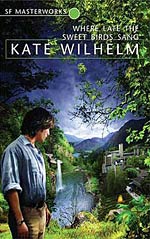
![]() couchtomoon
couchtomoon
12/28/2013
![]()
This 1977 Hugo winner about cloning is a powerful dystopic vision that addresses common social themes, such as the constriction of society, the strength of the individual, and the power of imagination. But there is nothing common about it. And it's not even about birds.
It's no surprise that this novel is cherished by many SF fans. Wilhelm does it right: the story is engaging; the characters are relatable; and the science is provocative. I have no complaints. None.
The novel is broken into three parts, each about a different generational character:
In addition to social issues, Where Late the Sweet Bids Sang evokes popular past and present SF concepts. The societal influence brings to mind LeGuin's The Dispossessed, the Hugo winner from two years prior. For TV lovers, the clones and their numbered monikers behave much like the cylons from Battlestar Galactica, while the references to "tree voices" resemble the disembodied "whispers" of Lost. Genre-hoppers might appreciate the creepy foreboding that edges on the brink of horror, and the unique romances that bloom within the twisted society. Wilhelm also posits an interesting theory regarding the affect of individuality on our potential for telepathy.
This story is close to perfect. If I had any criticisms, I would wish for more of each story, but I can see how that would negatively affect the overall tone and story. I also have a few questions about the transition of clone children from the nursery to care of the older clone siblings, and there are undefined chronological gaps between stories, which make it difficult to determine the duration of intervals between stories. (I kept wondering if and when the original family members had all died out). Regardless, this is all nit-picking, and the story proves its value as a must-read SF classic.
http://couchtomoon.wordpress.com/2013/12/28/where-late-the-sweet-birds-sang-a-novel-by-kate-wilhelm/